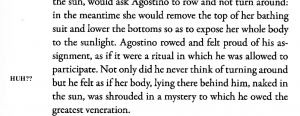Impression
My first impression of this book was that it reminded me of Sigmund Freud. I thought to myself, what in the Freud (using Freud as if he was an adjective) was going on whether Agostino would unconventionally describe his mother in a sexual manner. This reminded me of the time when I was taking introductory psychology in first year. The professor spoke briefly about Freud and one of the theories being the Odeious complex where sons supposedly have sexual desires for their own mothers, while resentment to their fathers. Although the case in this book was that Agostino’s father passed away, he did feel hatred and jealousy towards the young boatman because of the intimacy and relationship between the young boatman and his mother. It makes me wonder whether these instances are the yearning of affection from women who he has not seen many, thus he thinks about his mother this way. If I had not thought about the relation with the Freudian theory, I would have dreaded reading this because I felt uncomfortable.
Thoughts
Apart from the vivid, sexual imagery that Agostino thinks of his mother, the book does highlight other thematic elements including bullying, racism, and sexism. These elements were most dominant in the scenes involving the “gang” where they would make fun of Agostino’s mother or jokingly talk about her in a sexual way. Homs was one of the characters in the book who was also picked on and at times which is speculated as a result of his race. It felt like there was microaggression solely targeting Homs because of his race, in which he was the minority among the gang. The microaggressions felt further exacerbated with the way that Agostino would not use his name and rather just describe him as the black boy. The gang making fun of both of them being “lovers” aggravated Agostino’s disdain for Homs.
The sexism in the book was also not so subtle. There weren’t many women characters to begin with in this book as it was, to my knowledge, the mother and the woman at the house near the piazza. Women described in the book were pretty much objectified in a sexual manner, and the gang were the stereotypical “boys will be boys” in the essence of how they would think they can get with a woman. It didn’t really sit right with me how the book was, but I do think it’s notable that it does highlight real issues in our society. I wouldn’t say I hated reading this, but I did not indulge with what I read.
Question:
How do you feel about Agostino as a character?

One of my notes in the book
And what did you think of what I said in the lecture about Freud and the Oedipus Complex?
Meanwhile…
“Women described in the book were pretty much objectified in a sexual manner”
This is true in so far as it is how many of the characters see women, but of course isn’t the point of the book that Agostino’s mother (at least) doesn’t simply act as an object… and it’s this agency that (in part) perturbs her son?